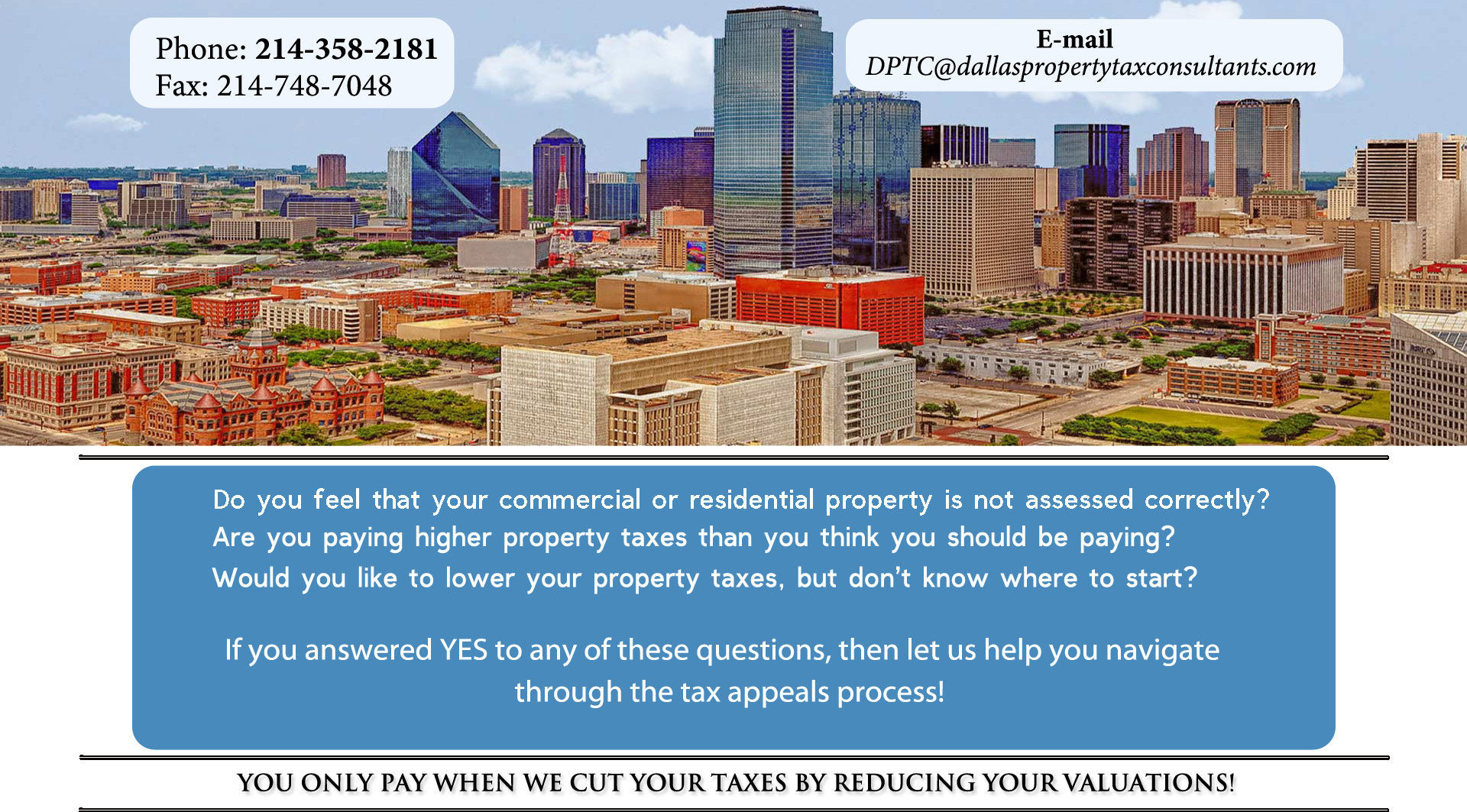Alright folks, let's dive straight into the world of Dallas property taxes. Whether you're a homeowner, an investor, or just someone curious about how the system works, this article’s got you covered. We’re breaking down everything you need to know about city of Dallas property taxes in simple terms so you can make informed decisions. Taxes can be a headache, but we're here to simplify it for you.
Property taxes in Dallas are a big deal, and they play a crucial role in funding essential services like schools, public safety, and infrastructure. Understanding how these taxes work is key to managing your finances and planning for the future. So, buckle up, because we're about to demystify the entire process.
Our goal is to give you a clear picture of what Dallas property taxes entail, how they're calculated, and how you can navigate the system. By the end of this guide, you'll be equipped with the knowledge to handle your property tax responsibilities like a pro. Let's get started!
Read also:Take A Look At The Report That Has Sparked A Debate Around Pricing Of Pharmaceuticals
Table of Contents
Overview of Dallas Property Taxes
How Dallas Property Taxes Are Calculated
Understanding Property Tax Exemptions
The Property Tax Appeal Process
A Brief History of Dallas Property Taxes
Read also:Take A Look At These Game Changing Ways To Leverage Presence On Reddit For Marketing
The Impact of Property Taxes on Homeowners
Future Trends in Dallas Property Taxes
Tips for Managing Your Property Taxes
Overview of Dallas Property Taxes
Let’s kick things off with the big picture. The city of Dallas property taxes are essentially a levy imposed on real estate owners to fund various public services. These taxes are a vital revenue source for the city, ensuring everything from street maintenance to school funding stays on track.
Now, one thing you should know is that property taxes in Dallas aren’t just a flat rate. They’re calculated based on the assessed value of your property and the tax rate set by local governing bodies. This means the amount you pay can vary depending on factors like location, property type, and improvements made to your home.
It’s also worth noting that Dallas property taxes are subject to change annually. Local governments review and adjust tax rates to meet budgetary needs, so staying informed is key. Keep an eye on any notifications from the Dallas Central Appraisal District (CAD) to ensure you’re up to date.
What Determines Your Property Tax Rate?
Several entities contribute to setting the tax rate in Dallas. The city government, school districts, and special districts all have a say in how much revenue is needed. This collaborative approach ensures that funds are allocated where they’re most needed.
For example, the Dallas Independent School District (DISD) is one of the largest contributors to your tax bill. They use the revenue to maintain schools, pay teachers, and provide educational resources. Understanding who’s involved in setting your tax rate helps you see where your money is going.
How Dallas Property Taxes Are Calculated
Alright, let’s break down the math behind city of Dallas property taxes. The process starts with determining your property’s assessed value. This is done by the Dallas Central Appraisal District, which evaluates properties annually based on market conditions, improvements, and other factors.
Once the assessed value is established, it’s multiplied by the tax rate to calculate your tax bill. Here’s a quick example: if your property is assessed at $250,000 and the tax rate is 2%, your property tax would be $5,000. Simple, right?
But wait, there’s more. Certain exemptions can lower your assessed value, reducing your tax bill. We’ll dive deeper into exemptions later, but for now, just know they can make a big difference in what you ultimately pay.
Factors Affecting Property Tax Calculation
Several factors influence how your property tax is calculated. Location plays a huge role, as properties in more desirable areas tend to have higher assessed values. The type of property also matters, with commercial properties often being taxed at higher rates than residential ones.
Improvements like adding a new room or upgrading your kitchen can increase your property’s value, leading to higher taxes. On the flip side, if your property’s value decreases due to market conditions or damage, your taxes may go down. It’s a dynamic process that requires regular attention.
Understanding Property Tax Exemptions
Exemptions are a game-changer when it comes to Dallas property taxes. These are reductions in your property’s assessed value, which directly lower your tax bill. There are several types of exemptions available, depending on your situation.
One of the most common exemptions is the homestead exemption. If your property is your primary residence, you can apply for this exemption to reduce your taxable value. Additionally, there are exemptions for seniors, disabled individuals, and veterans, offering even more relief.
Don’t forget about energy-efficient upgrades. Installing solar panels or energy-efficient windows can qualify you for additional exemptions, making your home greener and your wallet happier.
How to Apply for Exemptions
Applying for exemptions is a straightforward process. You’ll need to submit an application to the Dallas Central Appraisal District by the deadline, which is usually around April 30th. Make sure to gather all necessary documentation, such as proof of age or disability, to support your claim.
Once your application is approved, the exemption will be applied to your property’s assessed value, resulting in a lower tax bill. It’s a great way to save money while still contributing to the community.
Payment Deadlines and Methods
Paying your Dallas property taxes on time is crucial to avoid penalties and interest. The deadline for payment is typically January 31st of each year. If you miss this date, you’ll start accruing interest, so it’s essential to plan ahead.
Fortunately, there are several ways to pay your property taxes in Dallas. You can pay online through the Dallas County Tax Office website, by mail, or in person at their offices. Some banks even offer automatic payment plans, ensuring you never miss a deadline.
If you’re unable to pay your taxes in full, don’t panic. The city offers payment plans to help you catch up. Just be sure to contact the tax office and set up a plan before the deadline to avoid additional fees.
What Happens If You Don’t Pay?
Not paying your property taxes can lead to serious consequences. The city may place a lien on your property, making it difficult to sell or refinance. In extreme cases, they can even seize your property to recover the unpaid taxes.
To avoid these scenarios, always prioritize paying your property taxes. If you’re struggling financially, reach out to the tax office for assistance. They may be able to offer solutions to help you get back on track.
The Property Tax Appeal Process
Disagree with your property’s assessed value? You have the right to appeal. The property tax appeal process allows you to challenge the appraisal district’s valuation if you believe it’s inaccurate or unfair.
To start an appeal, you’ll need to file a protest with the Dallas Central Appraisal District. They’ll review your case and may request additional information or documentation. It’s important to provide strong evidence, such as recent property sales in your area or a professional appraisal.
If your appeal is successful, your property’s assessed value will be adjusted, potentially lowering your tax bill. Even if it’s not successful, appealing shows you’re proactive about your finances and willing to stand up for what’s right.
Tips for a Successful Appeal
Here are a few tips to increase your chances of a successful appeal:
- Gather comprehensive evidence to support your claim.
- Be prepared to present your case clearly and concisely.
- Stay calm and professional during the appeal process.
- Consider hiring a professional if your case is complex.
A Brief History of Dallas Property Taxes
Dallas property taxes have a rich history that dates back to the city’s founding. As the city grew, so did the need for revenue to support public services. Over the years, the system has evolved to meet changing needs and ensure fair taxation for all property owners.
One significant development was the establishment of the Dallas Central Appraisal District in the 1980s. This organization brought consistency and transparency to property tax assessments, ensuring everyone was treated fairly. Since then, the city has continued to refine the process, incorporating new technologies and methods to improve accuracy.
Looking back at the history of Dallas property taxes provides valuable context for understanding how the system works today. It’s a testament to the city’s commitment to fairness and accountability in taxation.
The Impact of Property Taxes on Homeowners
Property taxes have a direct impact on homeowners in Dallas. They affect everything from monthly budgets to long-term financial planning. For many, property taxes are one of the largest recurring expenses associated with homeownership.
However, they also provide essential services that benefit the entire community. Schools, parks, and public safety initiatives are all funded in part by property taxes. This creates a balance between personal responsibility and community contribution.
It’s important for homeowners to understand the impact of property taxes and plan accordingly. By staying informed and taking advantage of available exemptions, you can manage your tax burden more effectively.
Future Trends in Dallas Property Taxes
Looking ahead, several trends are shaping the future of Dallas property taxes. As the city continues to grow, tax rates may fluctuate to accommodate increasing demands on public services. Additionally, advancements in technology could streamline the assessment and payment processes, making them more efficient and user-friendly.
There’s also a growing focus on sustainability and energy efficiency. Expect to see more incentives for green upgrades and eco-friendly practices, encouraging homeowners to reduce their carbon footprint while saving on taxes.
Stay tuned for these developments and be ready to adapt as the landscape of Dallas property taxes evolves. Staying informed is the best way to protect your investment and ensure financial stability.
Tips for Managing Your Property Taxes
Managing Dallas property taxes doesn’t have to be a headache. Here are some practical tips to help you stay on top of things:
- Set up automatic payments to avoid missing deadlines.
- Regularly monitor your property’s assessed value and appeal if necessary.
- Take advantage of available exemptions to reduce your tax bill.
- Keep detailed records of all tax-related documents and communications.
- Stay informed about changes in tax laws and regulations.
By following these tips, you’ll be well-prepared to handle your property tax responsibilities with confidence.
Conclusion and Final Thoughts
There you have it, folks—a comprehensive guide to city of Dallas property taxes. We’ve covered everything from how they’re calculated to how you can manage them effectively. Remember, understanding your property taxes is key to making the most of your homeownership experience.
Don’t forget to apply for exemptions, pay on time, and stay informed about any changes in the system. If you ever have questions or need assistance, don’t hesitate to reach out to the Dallas Central Appraisal District or a qualified tax professional.
As a final call to action, we encourage you to share this article with others who may find it helpful. Knowledge is power, and the more we understand about property taxes, the better equipped we are to navigate the system. Thanks for reading, and happy homeownership!


